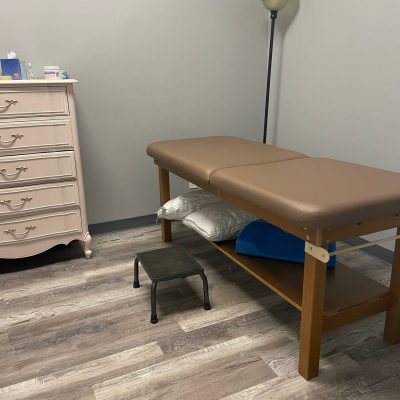When we think about pelvic floor issues—like leakage, pain, or difficulty relaxing—we often picture physical causes: childbirth, surgery, posture, muscle weakness. But as a pelvic floor physical therapist, I can tell you there’s another powerful piece of the puzzle that often gets overlooked: your mental and emotional well-being.
Stress, anxiety, and past trauma don’t just live in your mind. They leave an imprint on your body, and your pelvic floor is one of the places that can hold that tension.
Your Pelvic Floor: More Than Just Muscles
Your pelvic floor is a group of muscles, fascia, and connective tissues at the base of your pelvis. Physically, they support your bladder, bowel, and reproductive organs, and they control when you start and stop using them.
But here’s the thing: your pelvic floor is directly connected to your nervous system. It responds to emotional states just as much as it responds to physical movement.
How Stress & Anxiety Affect Pelvic Floor Muscles
When you feel stressed or anxious, your body shifts into “fight, flight, or freeze” mode. This is your sympathetic nervous system gearing up to protect you.
In that state:
- Your breathing becomes shallow
- Your shoulders and jaw may tense
- And—without you even realizing it—your pelvic floor muscles tighten
For short bursts, that’s fine. But when stress becomes chronic, your pelvic floor may stay in a heightened state of tension. Over time, this can lead to:
- Pelvic pain
- Urinary urgency or leakage
- Difficulty with bowel movements
- Pain with intimacy
- Trouble fully relaxing the pelvic floor
The Role of Trauma
For people who have experienced trauma—whether medical, physical, or emotional—the pelvic floor can hold protective tension as a form of subconscious guarding. This is especially true for those with a history of pelvic or sexual trauma, but it can also happen after non-related events like a car accident, long-term illness, or emotionally distressing periods of life.
The nervous system remembers, and the pelvic floor often reflects that memory through altered muscle tone, pain, or changes in function.
It’s Not Just “In Your Head”
The symptoms you feel are real and physical, even if stress or trauma is the root cause. Imagine clenching your hand into a fist for hours—eventually, your hand would ache, feel weak, and lose flexibility. Your pelvic floor works the same way: chronic tightening leads to dysfunction.
Signs Your Pelvic Floor Symptoms May Be Stress-Related
While each person’s situation is unique, here are some patterns I often see in my clinic:
- Symptoms worsen during stressful weeks and improve when you’re more relaxed
- Pelvic pain that seems “random” or doesn’t match a clear injury
- Difficulty starting urination or feeling like you can’t empty fully
- Constipation without obvious dietary cause
- Pain with intercourse that increases during life stressors
How Pelvic Floor PT Addresses the Mind–Body Link
When we work on pelvic floor health in the context of mental well-being, our approach is more than just exercises. We focus on nervous system regulation, body awareness, and movement retraining.
Here’s what that might look like:
- Breathwork
Your diaphragm and pelvic floor work together with every breath. Deep, slow belly breathing helps shift you into a calmer “rest and digest” state while encouraging the pelvic floor to release tension.
- Gentle Manual Therapy
If appropriate and with your consent, internal or external pelvic floor techniques can help restore normal tone and mobility. The key is to approach this in a trauma-informed, patient-led way.
- Awareness Training
Many people aren’t aware when they’re holding their pelvic floor tight. We practice “body scans” and mindful check-ins throughout the day so you can recognize tension before it builds.
- Movement & Stretching
Gentle yoga poses, hip openers, and positions that relax the pelvic floor—like child’s pose or supported deep squats—can help retrain your muscles to let go.
- Stress Management Tools
We integrate relaxation strategies you can use outside the clinic:
- Guided meditation or mindfulness
- Journaling
- Gentle walks or nature time
- Progressive muscle relaxation
Your Nervous System Is Part of the Treatment Plan
One of the most important things I share with patients is that pelvic floor recovery isn’t just about strengthening or stretching. It’s about creating a safe, supported environment—both physically and emotionally—so your nervous system allows the muscles to function normally again.
That might mean:
- Slowing down your return to high-impact exercise until your body feels ready
- Working with a mental health professional alongside pelvic floor therapy
- Addressing sleep, nutrition, and other whole-body wellness factors
When to Reach Out for Help
If your pelvic floor symptoms seem connected to stress, anxiety, or trauma—or if they’ve been persistent despite your best self-care—it’s time to see a pelvic floor physical therapist. We can help you:
- Identify whether muscle overactivity or underactivity is at play
- Teach you strategies to release tension and improve muscle coordination
- Support you in regaining trust in your body
The Takeaway
Your pelvic floor doesn’t exist in isolation—it’s influenced by every system in your body, including your mind. Stress, anxiety, and trauma can cause real, physical changes in muscle tone and function. The good news? With the right combination of pelvic floor therapy, nervous system regulation, and emotional support, you can restore balance and function.
Pelvic floor health is about more than just muscles—it’s about feeling safe, supported, and in control of your body again. And that’s a journey worth taking.







